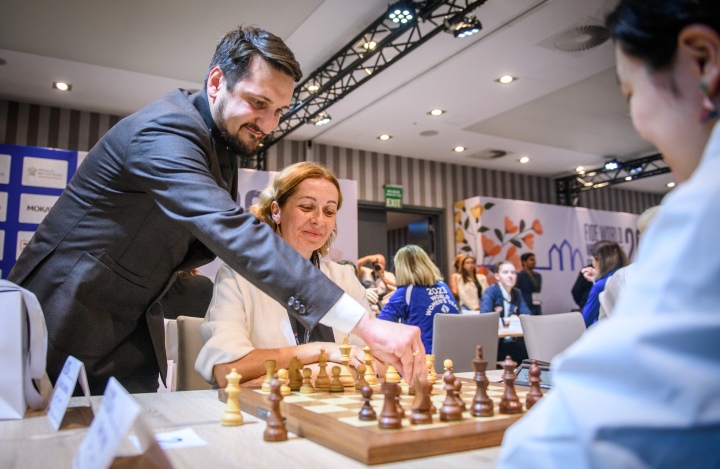
13-year-old Alice Lee defeated former Women’s World Champion Antoaneta Stefanova. Kazakhstan surprises, taking the lead following the defeats of India and Georgia.
Round 1
In the Pool A, Georgia scored the best result of the round, a resounding victory by 3½-½ against a direct rival, Ukraine. The Georgian players cemented their win thanks to their dominant performance on the White boards: Meri Arabidze and Lela Javakhishvili showed great drive, and with an accurate play, they got the full point against Nataliya Buksa and Anastasiya Rakhmangulova, respectively. Khotenasvili, with Black on the first board, played a solid Grunfeld line and drew comfortably against Ushenina.

The result could have been much closer, though, had Inna Gaponenko managed to convert the winning position she achieved against Nino Batsiashvili. However, the Ukrainian IM, who often falls in time scrambles, let the victory slip at the exact moment when she was going for the kill. Batsiashvili grabbed her chance and, with ingenious play, pulled off the biggest swindle of the day.
India defeated France 3-1, but some of the games in the match were quite double-edged, and at times, it seemed as if the match could go either way. Vantika Agrawal is in great shape, and her sound king move 15.Ke2! gave her the upper hand against Deimante Daulyte-Cornette, who shortly after lost a pawn.
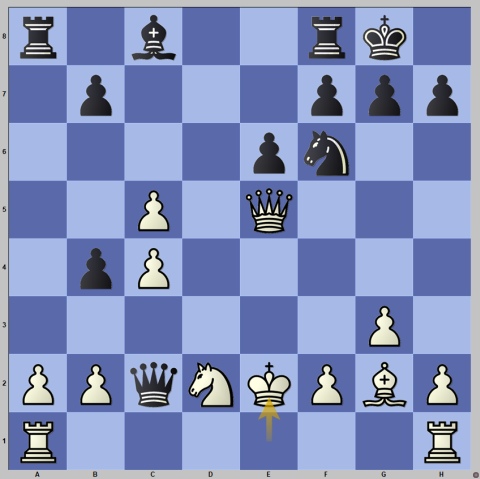
Vankita’s conversion of her material advantage was flawless. Another Indian player in great shape is Divya Deshmukh, who arrived in Bydgoszcz as the surprising winner of the Tata Steel Rapid India with a splendid performance. With Black, she put Anastasia Savina under some pressure, and the French second board succumbed after making two mistakes in succession, 18.g3 and 20.Kg2. Divya was merciless and punished her opponent with a strong hand.
Kazakhstan got a scare very early into the game, as in the second board both players seemed to have mixed up the move order in a Najdorf. Shahenda Wafa played a premature 9.e5, and Kamalidenova got confused and played 9…dxe5 right away (instead of 9…Bb7), giving White a chance to get a decisive advantage with 10.Ndxb5!
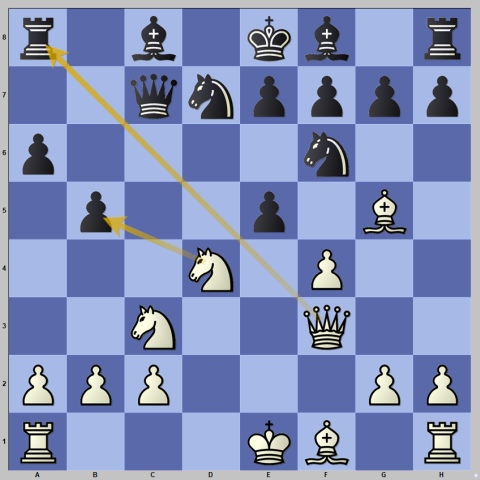
However, the Egyptian player also missed this intermediate move, but without it, the a8-rook is a Trojan horse. Kamalidenova did not give her opponent a second chance. On the first board, Bibisara Assaubayeva was also ruthless as she outplayed Shrook Wafa, sealing the result at 3-2 for the Kazakhstani players.
In Pool B, the home team lost against China by 2½ – 1½ in a match with several twists. Aleksandra Maltsevskaya, making her debut with the Polish national team, played a bit shaky in the opening (with black), and fell into a trap by Kaiyu Ning. Being down material since move 20, Aleksandra kept the game going, hoping for a miracle, and her resilience was rewarded, as Kaiyu failed to deliver a final blow.

The very experienced Monika Socko got a clear edge against Yang Shen when the young Chinese misplayed the opening; however, Socko rushed to simplify the position and let the advantage slip, agreeing to a draw after 31 moves. The match was decided on the fourth board, where IM Qi Guo outplayed Michalina Rudzinska.
Another thrilling match was the one between Germany and the US. The world is eager to see how 13-year-old Alice Lee will perform in the international arena, and her game today against such an experienced player as Elisabeth Paehtz was an excellent test to start with. With Black, the German GM rejected an early possible draw by threefold repetition against the young prodigy and tried to keep the game going for as long as possible, building some initiative. However, Alice never gave her opponent the slightest chance to get an advantage, and the game was a draw after 75 moves.

The match was decided on the second board, where Dinara Wagner lost to Anna Zatonskih. Despite playing one of her pet openings, the Catalan, and being, in general, a very well-prepared player, Dinara seemed to struggle during the whole game to find a safe square to place her Queen, and on move 30, she blundered a knight.
The match between the team FIDE Americas and Bulgaria was a very close affair, which came to an unexpected conclusion. The American ladies got ahead on the scoreboard after Lisandra Ordaz, with black, defeated former World Champion Antoaneta Stefanova in great fashion. The position around move 30, where the Cuban IM had a very strong Knight on d4 while Stefanova’s was stuck on a6, is very illustrative.
Meantime, Jennifer Perez had Viktoria Radeva against the ropes, so it was all set for a convincing victory for FIDE America. Very short of time, Jennifer started to chase the black king, who ran away across the entire board and managed to hide from the threats for long enough to make her lose on time, despite the time increment of 10 seconds per move. In the end, it was 2-2 and a little setback for the South American players.

Round 2
The second round of the day was packed with action: only a few games were decided in the first hour of play, but then, as the end of the afternoon was nearing, quite a few games took an unexpected turn. Kazakhstan took the lead in pool A after Georgia was defeated by France (2½ – 1½), while the USA and China are in command of pool B.
Things started on the wrong foot for Georgia, as Salome Melia blundered a pawn early in the opening against Natacha Benmesbah, and could not offer much resistance. The game between Deimane Daulyte-Cornette and Bela Khotenashvili was a beautiful fight to watch. Demaine was by no means better, as Black’s bishop’s pair was restricting her play; however, the French player seized the initiative with her plan 22.g4-g5-g6.
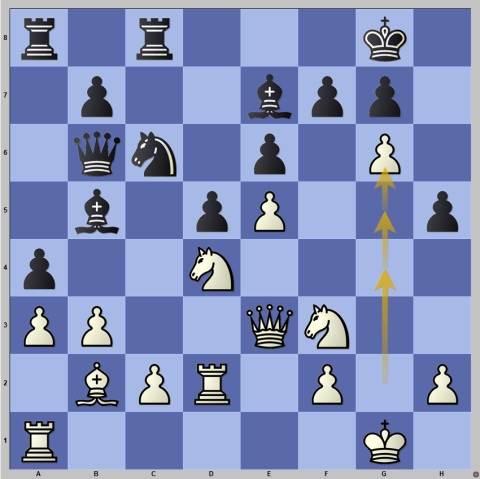
The position that emerged, with the White knights creating all kinds of threats, was extremely difficult to assess in a rapid game. Unfortunately, when the tension was reaching its peak, and the game was at its sharpest, Bella blundered a Rook. Things could have been even worse for the Georgians, as Mitra Hejazipour completely outplayed Lela Javakhishvili and reached an absolutely winning position that, somehow, she managed to lose. As is often the case, the blunders came in pairs: 32.Rc3?? and 33.Rc4? ruined White’s position.
India’s defeat at the hands of the young Kazakhstan team (2½-1½) can be considered a surprise. Fatigue was probably a factor, as the Indian players were the last ones to arrive in Bydgoszcz after a long trip, so late into the evening that they even missed the opening ceremony.

Harika failed to get anything with White against Assaubayeva, and the game reached a Rook endgame that was a dead draw – the same result as in boards 2 and 3. It was Amina Kairbekova, on the fourth board, who tipped the balance in favour of the Kazakhstani: playing with White, she sacrificed a pawn in exchange for the bishop’s pair and the initiative, preventing Black from castling. It proved to be a sound decision, as Savitha’s Rook on a8 could never get into play; under pressure, the Indian player made a mistake (23…f5?) that eventually cost her the game.
Egypt might be the lowest-rated team in the field by a considerable margin, but their first board, Shrook Wafa, made clear that she was ready to compete against the top guns, and she made a draw against the very experienced Inna Gaponenko. Ukraine sealed the match with victories on boards 2, 3 and 4.
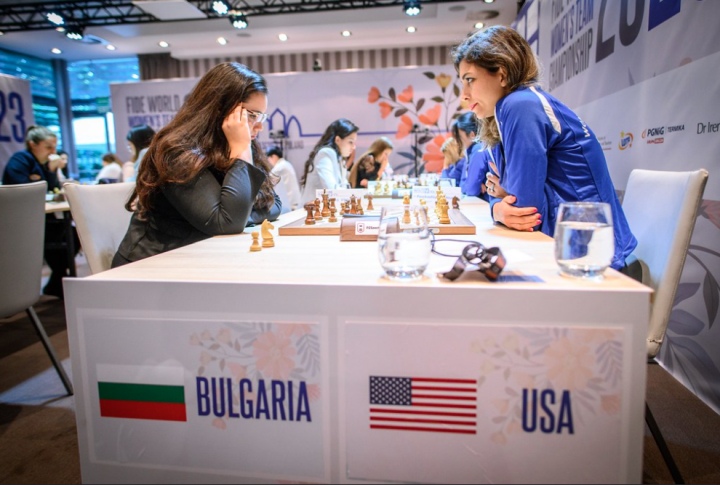
In pool B, the sensation was the triumph of the USA over Bulgaria by 4-0, including the first victory by 13-year-old Alice Lee in the competition and her very first against a former Women’s World Champion. The game was equal, and should have ended in a draw, but in an apparently dead endgame, Stefanova went wrong (overpressed?) with 39.h6?, and Lee was quick to grab the opportunity.
Despite the flashy score in the USA-BUL match, probably the most important result of the round was the victory of China over Germany, by 3-1. With the black pieces, 18-year-old Yuxin Sing managed to neutralize Elisabeth Paethz. A bit more eventful was the clash on board two, where Josefine Heinemann achieved a winning position with Black, but a couple of imprecisions made her advantage vanish as if it had never existed. The match was hence decided on the two last boards. Yiyi Xiao dominated Fiona Sieber from beginning to end, while Jana Schneider missed a tactic against Qi Guo and lost on the spot.
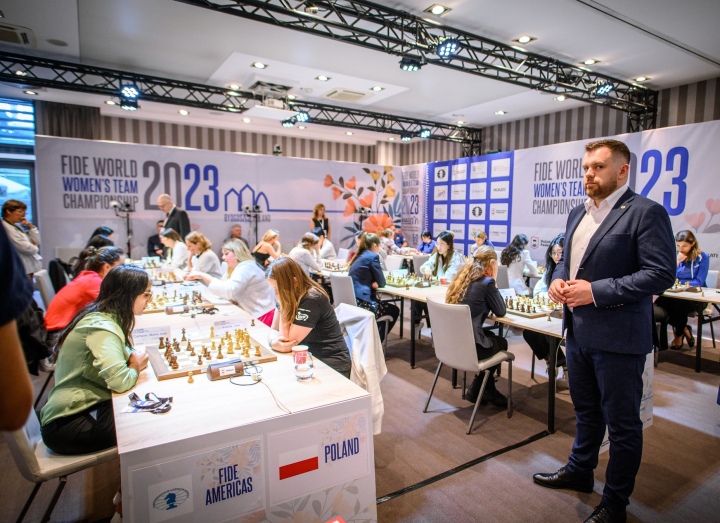
Poland bounced back from their round-1 defeat with a nice victory over FIDE Americas, in which the two Cuban players were the victims. Oliwia Kiolbasa scored an unquestionable victory over IM Lisandra Ordaz. Yerisbel Miranda played a fine attacking game against Klaudia Kulon and could have won in a spectacular fashion.

After 33.Nf5! White could have got to the Black’s king but instead Lisandra went for 33.Qh6?, a piece sacrifice that simply doesn’t work. Deysi Cori scored a victory for the American team, with a brilliant attacking game against Monika Socko, but it was not enough to save the match.
Standings after Round 2:
Pool A
Kazakhstan – 4
Georgia – 2
Ukraine – 2
India – 2
France – 2
Egypt – 0
Pool B
USA – 4
China – 4
Poland – 2
FIDE Americas – 1
Bulgaria – 1
Germany – 0
Round 3 pairings:
Pool A
Kazakhstan – France
Ukraine – India
Georgia – Egypt
Pool B
USA – FIDE Americas
China – Bulgaria
Poland – Germany
Written by David Llada
Photos: Michal Walusza
Official website: worldwomenteams.fide.com.
About Bydgoszcz
Located in northern Poland, less than 200km from the capital, Warsaw, Bydgoszcz sits at the junction of the rivers Vistula and Brda. With 350,000 inhabitants, it is served by its own domestic airport. An architecturally rich city, Bydgoszcz is home to a number of universities, like the Casimir the Great University, the University of Technology and Life Sciences and a conservatory. With a thriving cultural life, it also hosts the Pomeranian Philharmonic concert hall and the Opera Nova opera house. More information: bydgoszcz.pl



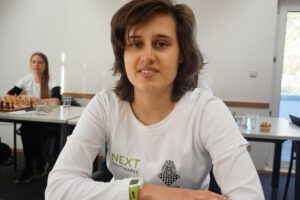


More Stories
Chess in New York: A walk through parks, clubs and history
FIDE World Rapid and Blitz in New York preview: An epic ending to 2024
„Schach als Brücke für Frieden und Hoffnung“
Season’s greetings from FIDE President
Full list of participants for 2024 WRB announced
Gukesh D crowned 18th FIDE World Champion